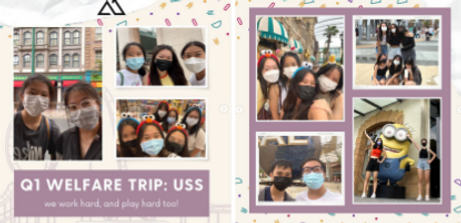In a previous article, Zenith shared with you how to make the tough decision between O Level Biology and O Level Physics. Today, as part of our secondary school series, we will be giving you tips on how to choose between different secondary school streams. There are two distinct streams that you will be able to choose from as you take on your upper secondary education: the science stream and the arts stream.

For double science, the combinations are not as direct, and you will be choosing between pure Biology and pure Physics (Chemistry is compulsory as it’s considered the fundamental science to learn for foundational knowledge), as well as between various humanities modules that your school offers. Many students who wish to strengthen their grasp of Chemistry at this stage often seek O Level Chemistry tuition Singapore to better prepare for upper secondary content.
In the double science track, you will likely be offered one pure humanity and one combined humanities, which will often be SS and another elective. The choice of the pure humanities depends on what your school offers; every school offers different combinations. However, the standard combination for double science usually looks something like this:
The science stream
The science stream essentially comprises 2 or 3 pure science subjects (Biology/Physics/Chemistry) and combined humanities.
Express stream (Pure sciences)
You can either take on triple science or double science. In triple science, you will be taking pure Biology, pure Chemistry, and pure Physics with combined humanities. In most schools, combined humanities often refer to Social Studies (SS) and another elective. SS is usually compulsory, and most schools offer either Elective History, Geography, or Literature! So your combination may look like this:
- Triple science + SS/History
- Triple science + SS/Literature
- Triple science + SS/Geography
- Pure Biology, pure Chemistry + SS/History OR SS/Literature OR + SS/Geography + one pure humanities
- Pure Physics, pure Chemistry + SS/History OR SS/Literature OR SS/Geography + one pure humanities
- Pure Physics, pure Biology + SS/History OR SS/Literature OR + SS/Geography + one pure humanities (less common)
Common pure humanities subjects that schools offer are as such:
- Literature
- History
- Geography
- Economics
- Principle of Accounts
Students usually take about 8 subjects;
- English
- Elementary Math & Additional Mathematics ((often supported through O Level Math tuition)
- Mother Tongue
- Double Science / Triple Science (x2 or x3)
- Humanities (pure or combined)
Always check with your school to be sure of the subjects they offer!
Normal Academic stream / Combined Science
For students in the Normal Academic (NA) stream or those who’re taking combined sciences, the choices offered are usually very similar! The only difference is that instead of choosing between the pure sciences, you will be choosing which sciences to take together as a single subject! For Combined Sciences, options typically include:
- Chemistry/Biology
- Chemistry/Physics
- Biology/Physics (less common)
Students in the NA stream and/or taking combined science will usually take about 6 to 7 subjects, and these include;
- English
- Elementary Mathematics
- Principle of Accounts / Additional Mathematics (might not take either or might take both)
- Humanities
- Mother Tongue
- One elective like Design and Technology / Art / Food and Consumer Education
Triple Humanities
In the past, it was common for schools to offer students a triple humanities course, and as its name suggests, it means that you do not take a Science subject at all. However, this path closes a lot of doors for students in Junior College, Polytechnic, as well as University. Many of the courses in further education institutions often include a science subject as a prerequisite.
However, there are a few schools today that still offer this program.
Pure Humanities vs Elective Humanities
At this point, you may be wondering, what then, is the difference between pure humanities and elective humanities? Well, here at Zenith Education Studio, we have got the answer for you! Pure humanities and elective humanities typically vary in terms of the syllabus content. As its name suggests, pure humanities will cover more content, while elective humanities will cover less. And of course, this goes for the examinable papers as well, pure humanities students usually do 2 papers while elective humanities students only do 1 paper. The content and layout of each paper vary with the subject that you take, so do check out the SEAB website to make sure! For example, pure Literature students will take 2 papers, paper one and paper two, while elective students will only take paper one. Pure Literature students will also cover two books, while elective students will merely cover one. So, when deciding between pure and elective humanities, think about the content coverage and which would suit you better!
Being one of the best secondary tuition and IP tuition centers in Singapore, we have compiled 4 things to look out for when you’re making your choice. Rest assured that you are in good hands because we have an excellent track record of 85+% distinction at the O Levels (across all subjects) amongst our upper secondary students!
#1: Lower secondary results
This is a crucial factor in your decision-making process. At the upper secondary level, content for subjects will be more in-depth, and the requirements will be more challenging. For example, for the Biology section in lower secondary science, you may have had just 5 examinable topics, and your paper might have consisted of just a few Biology questions. However, at the O Level examinations, there are 22 examinable topics, and 3 full papers to take in total for pure Biology. Your results in lower secondary may be a really good indicator of your ability in the respective subject. Take this into consideration, because you do not want to be struggling for the next two years! Besides aptitude for a subject, certain schools will have certain requirements for you to meet if you want to take a subject. For example, in order to take pure subjects like the pure sciences or pure humanities, your school might require you to get a B3 or above for said subject at your end-of-year examinations. So check with the committee as well before making your decision to avoid any disappointments!
In cases where you wish to take pure sciences but do not qualify, do not be too disheartened! Some schools offer students the option to switch to pure sciences if they perform very well in combined sciences! Even if your school does not have this option, continue to study hard. If you obtain an A1 for combined science, you may be eligible for pure sciences (also known as H1/2 Biology / Physics / Chemistry) in Junior College!
#2: Syllabus
In order to make an informed choice, you must check out the SEAB syllabus for the various subjects you’re interested in! Make sure that the year you are looking at is the one you will be taking your examinations in. If you will be taking the O Levels in 2024, look at O Levels 2024 syllabus and not the one for 2023. This is extremely crucial because the content guidelines and requirements vary from year to year.
After looking at the syllabus, make a pros and cons list of the subjects you are deciding between. Some examples of pros:
- Especially interested in chapters 5-10
- Proficient in essay writing
- A good foundation in lower secondary for topic XXX
Some examples of cons
- Have not taken the subject before (e.g Additional Mathematics)
- Not good at science practical
- Not good at memory work for heavy content-based subjects
Weigh out your pros and cons and try to make a balanced decision! Remember, you don’t have to make this choice alone. Talk to a trusted adult, like your parents, your teachers, and even your tutors here at Zenith! Talking to a tutor that understands you will be immensely helpful in this process because he/she will then be able to give you insight into your performance and advice on what they think is best for you. Here at Zenith, we believe in fostering close relationships between students and tutors! We believe that the Zenith experience goes beyond academics; our tutors are truly invested in your all-rounded wellbeing. Our tutors are always ready to support their students in any way they can be it giving advice or treating them during our welfare week! Yes, you heard right! We have welfare weeks held every month just for our students! We also know that the A or O Level journey can be an incredibly tough one, which is why we also like to encourage our students with termly outings (Fig 1.). The Zenith experience is truly one like no other.

#3: Junior College / Polytechnic prerequisites
Depending on what subjects you wish to take in Junior College, you may need to have taken the subject at O Level. For many Junior Colleges, in order to take the various sciences (Biology, Chemistry, Physics) at an H2 level, you will need to have taken the subject at O Level and have obtained at least a B3. Some Junior Colleges are more lenient than others and may entertain appeals, but most colleges do stick to their listed requirements! Every Junior College, however, has different requirements for each subject at varying Higher Levels (H1/2/3) so do be sure to just check their websites out beforehand if you’re already sure of the subjects you want to take at the Junior College level!
Going to Polytechnic? Some courses may have prerequisites as well. Every Polytechnic has different requirements for each course, but the general rule of thumb is that courses like Biotech Engineering, Pharmaceutical Science, and Life Sciences all require you to have taken Biology/Chemistry/Physics at the O Levels! Head over to every Polytechnic’s website to check the requirements out to prevent disappointment!
Zenith is the perfect choice if you are looking for a new tuition community in your secondary or junior college years! Here at Zenith, we boast an excellent track record of a 66+% distinction rate among our students for the 2021 A Levels, and an 85+% distinction rate for the 2021 O Levels (across all subjects). We look forward to seeing you in our warm and vibrant community, don’t hesitate to sign up today!





